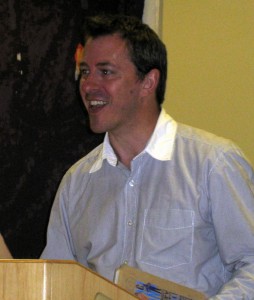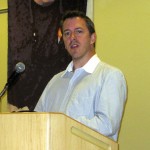How to really kick the fossil fuel habit
If you’d like to hear some upbeat ideas and inspiration for weaning ourselves off of oil, watch this video of Amy Goodman’s round table featuring Sierra Club Exec Director Michael Brune and Rocky Mountain Institute Scientist Amory Lovins. Whereas many people have harshly criticized Obama’s recent speech regarding the Gulf tragedy, Lovins sees a significant policy shift. He notes that President Obama is now seeking to end our addition to all fossil fuels, not just oil. Second, he heard a new approach to consensus building:
[H]e pointed out that this has cost—our dependence on fossil fuel has cost not only to our economy but also to our national security and our environment. And I think that starts a new conversation of a new kind in energy policy, because we’ve always supposed people had to want the same things we wanted in energy for the same reasons. So if you had different priorities than somebody else, you couldn’t agree on the outcome. What the President started to do here is to say, let’s focus on outcomes, not motives, and then we can build a strong consensus. Whether you care most about national security or environment or economy, we ought to do the same things about energy. And if we do the things we agree about, then the things we don’t agree about become superfluous.Lovins mentioned several effective techniques for reducing our use of fossil fuels. For example, we can use “freebates,” whereby those who insist on purchasing less efficient products are hit with surcharges that directly flow to reducing the prices of more efficient products. France used this approach regarding automobiles two years ago and cut the sales of inefficient cars by 40%. Doing things like this will “align the incentives, which will change behavior.” Lovins also stresses that more states need to use the energy utility model employed by California and Oregon, whereby the utilities are rewarded by cutting our use of fuel rather than by selling us more fuel. He further indicates that most of the electricity we use is completely wasted. He is a big fan of “net metering,” whereby those who produce more electricity than they use (e.g., by use of solar panels) can make money by running their meters backwards and selling that energy to their electric utility. A dramatic illustration of what we could look forward to comes at the 38 minute mark, where Lovins describes his own 4,000 square foot incredibly energy efficient home near Aspen. Of course, many Americans will hate these ideas. They will see nothing by deprivation, and they’ll fail to see the immense benefits for making big changes in how we make and use energy. Bob Cesca senses this too, and suggests that this is why President Obama ended his speech by asking Americans to pray, rather than telling us to get ready to make changes in our lives.
The president wrapped up his address Tuesday night by asking Americans to pray for the victims -- both human and environmental -- of the BP oil spill. I thought it was a strange way to end his first Oval Office address during a national emergency insofar as praying makes the situation appear too big for conventional solutions. As though all that remains between us and a sea of oil is the Hail Mary. This morning it occurred to me that this was the only thing he could really ask Americans to do.Why? Simply stated, it doesn't require any effort to silently invoke spirituality while stopped at a traffic signal . . .
What should Obama have done rather than invoking supernatural beings?Instead of prayer, the president could have asked us all to make sacrifices towards the goal of weaning ourselves off of fossil fuels. Maybe he should have asked for sacrifice. It probably wouldn't have hurt. But it would have been mostly ignored. Americans simply don't do "national sacrifice" anymore.I’m concerned that Cesca is correct, but I still hold out hope. I suspect that the reason that so many American resist doing anything is because they don’t want to be doing something while others are doing nothing. They don’t want to be seen as suckers. Therefore, our aim should be to make it clear that we’re all going to do this together. We’re need to let everyone know that we're all going to hold hands and jump in.



